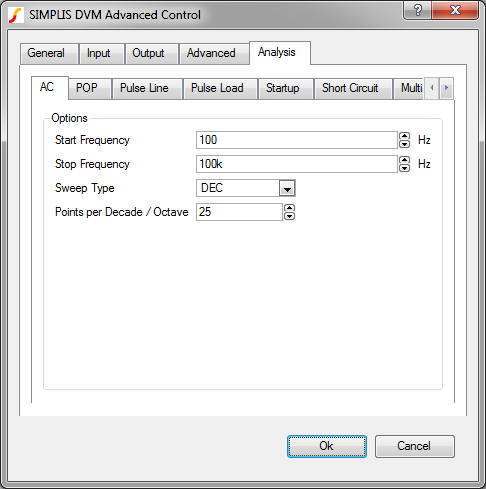DVM - Design Verification Module
|
The purpose of the ConductedSusceptibility() test is to determine the converter's ability to reject a small-signal perturbation at the input. To measure this susceptibility, DVM automatically connects a special susceptibility probe between the input source and each managed DVM load. The input is configured as a DC Input Susceptibility Source, and the output is configured as a Resistive Load.
Both a POP and an AC analysis are used in the ConductedSusceptibility() test.
The POP and AC analysis directives are taken from the POP tab and the AC tab of the Full Power Assist DVM control symbol. The AC tab is shown below.

The test report includes source, load, and susceptibility graphs as well as the following scalar values which are defined in the Measured Scalar Values section below:
|
|
In this Topic Hide
The susceptibility probe includes an AC probe and two voltage-controlled sources to galvanically isolate the input and output from ground.

The ConductedSusceptibility() function has the following syntax with the argument described in the table below:
ConductedSusceptibility(REF)
| Argument | Range | Description |
REF |
n/a |
The actual reference designator of the DVM source or the generic syntax of INPUT:n where n is an integer indicating a position in the list of managed DVM sources. |
The ConductedSusceptibility() test objective sets the source and load subcircuits to the following:
| Source | Load |
Loads other than the output under test are set to the Resistive Load. All other sources are set to the DC Input Source.
The ConductedSusceptibility() test objective measures the following scalar values:
Scalar Name |
Description |
Efficiency |
The overall efficiency of the converter taken from the POP simulation |
| Power(LOAD{load_name) | The power of each input source taken from the POP simulation |
| Power(SRC{load_name}) | The power of each output load taken from the POP simulation |
| min_reject1_gain | The minimum value for the gain during the AC analysis |
| max_reject1_gain | The maximum value for the gain during the AC analysis |
| min_reject1_gain_freq | The frequency where the gain is at its minimum value |
| max_reject1_gain_freq | The frequency where the gain is at its maximum value |
| min_reject1_phase | The minimum value for the phase during the AC analysis |
| max_reject1_phase | The maximum value for the phase during the AC analysis |
| min_reject1_phase_freq | The frequency where the phase is at its minimum value |
| max_reject1_phase_freq | The frequency where the phase is at its maximum value |
sw_freq |
A number which represents the converter switching frequency |
In the following table, {load_name} is the name assigned to each load. The default value is LOAD. DVM forces each load name to be unique so that the scalar and specification values for each load are unique.
Specification Name |
PASS/FAIL Criteria |
Min_V{load_name} |
The minimum value of the output voltage during the simulation time is greater that the minimum specification value. |
Max_V{load_name} |
The maximum value of the output during the simulation time is less than the maximum specification value. |
The ConductedSusceptibility() test objective is used in several built-in testplans. The managed source and load designators INPUT:1 and OUTPUT:1 are defined in the Full Power Assist DVM control symbol. The tests configures the source to use the Nominal symbolic value from the Input tab and configures the load to the Light symbolic value from the Output tab.
| *?@ Analysis | Objective | Source | Load | Label |
| Ac | ConductedSusceptibility(INPUT:1) | SOURCE(INPUT:1, Nominal) | LOAD(OUTPUT:1, Light) | Ac Analysis|Conducted Susceptibility|Vin Nominal|Light Load |
You can view the complete test report in a new browser window here: ConductedSusceptibility() Test Report. Below is an interactive link to the same test report.
© 2015 simplistechnologies.com | All Rights Reserved